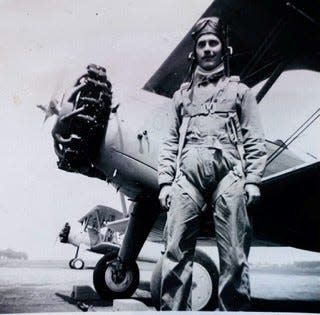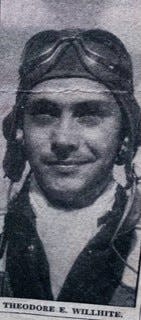A Iowan who fought in World War II was identified 80 years after his plane crashed
- Oops!Something went wrong.Please try again later.
Nearly 80 years after his death, a federal agency has identified a pilot who was killed in World War II as a man from Muscatine.
The Defense POW/MIA Accounting Agency notified family last fall that it had exhumed remains and identified them as U.S. Army Air Forces Maj. Theodore Willhite, 26. His family will now decide where and when to bury Willhite.
When was Maj. Theodore Willhite last seen?
On March 11, 1944, Willhite was a co-pilot on a B-24 aircraft on a mission to strike German submarine pens and repair sheds at the harbor in Toulon, France, according to Sean Everette, spokesperson for the agency. While over the target, the group met heavy enemy fire and Willhite's plane received a direct hit, igniting a fire in the fuselage.
Eyewitnesses at the time recalled the plane "spinning out of control at approximately 3,000 feet before breaking apart and crashing into the sea," according to a news release from The Defense POW/MIA Accounting Agency.
There were 11 people on board and no one saw parachutes deployed.

What happened to the people on board Maj. Theodore Willhite's plane?
A German report made after the incident said a B-24 crashed in the sea and 10 unidentified bodies were buried in a cemetery in Toulon. A second report noted a B-24 crashed on a peninsula south of the Toulon harbor and listed eight members of Willhite's crew but not Willhite himself, according to Everette.
U.S. officials believed at the time the two German reports were about the same airplane.
U.S. grave registration teams could not look for Willhite until after German forces left France. And it was unclear exactly where the bodies recovered were buried, according to Everette.
How was Maj. Theodore Willhite identified?
A group was tasked in 1945 with recovering Americans missing in European combat.
The following year, the American Graves Registration Command identified seven sets of remains that belonged to Willhite's crew in the Lagoubran Cemetery in Toulon. Everette said four unidentified remains, which were thought to be members of the U.S. Army Air Forces with injuries consistent with airplane casualties, were found adjacent to them. All were placed in the Rhone American Cemetery in Draguignan, France, according to the release.
It was thought at the time that Willhite's plane crashed several miles off of the French coast in the Mediterranean Sea and that finding his remains would be unlikely. He was declared non-recoverable in 1951.
But in 2019, authorities exhumed the unidentified remains in Rhone and sent them to the Defense POW/MIA Accounting Agency. Willhite was identified using anthropological and mitochondrial DNA analysis.
His family was notified of the match in September 2023, according to the release.
Willhite's name is among others on the Walls of the Missing at Rhone American Cemetery. A rosette will be placed next to his name to show he has been accounted for.
Maj. Theodore Willhite was given posthumous awards

In January 1944, Willhite was headed to a bomb mission in Italy when the plane was seriously damaged. The pilot was killed and the co-pilot stunned, according to a Muscatine Journal article from Dec. 8, 1944.
The article said the engine caught fire and the plane took a deep dive but "Major Willhite, displaying outstanding resourcefulness and courage, managed in spite of the fact that he himself had been wounded, to remove the pilot who had slumped over the controls and assisted the co-pilot in regaining control of the aircraft."
Willhite then extinguished the fire in the engine and preceded to have a successful bombing run, according to the article.
"By his exceptional initiative and coolness under fire, Major Willhite's quick thinking and superior leadership undoubtedly saved the lives of the entire crew and prevented the destruction of the aircraft," the article said.
Two awards were given to Willhite's widow Virginia after his death for his service: the Distinguished Flying Cross and the Air Medal.
Noelle Alviz-Gransee is a breaking news reporter at the Des Moines Register. Follow her on Twitter@NoelleHannika or email her at NAlvizGransee@registermedia.com.
This article originally appeared on Des Moines Register: How a WWII Muscatine man was recently identified and how he died
